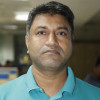Patients with bullet, pellet wounds: Dhaka hospitals stretched to the limit

Some of them are teens, some in early 20s and many are middle-aged men. The one thing common between all of them is that they have been shot either by shotgun pellets or bullets, as police and BGB opened fire at protesters and alleged infiltrators during the recent unrest centring the quota protests.
Many claimed they had nothing to do with the violence or protests. According to them, they were either harmless onlookers or commuters who had to venture out for different emergencies. And now, they are barely surviving on hospital beds, after coming in the line of fire.
From Thursday, Dhaka hospitals, mainly Dhaka Medical College Hospital, were stretched to their limits with patients suffering from pellet and bullet wounds.
Take the case of Shafiqul Islam.
He was shot in his back on Sunday evening when he went out to see what the situation was outside.
When these correspondents visited DMCH yesterday, his four-year-old daughter Fatema was peacefully sleeping beside him.
But peace was the last thing on Shafiqul's mind. He was barely awake, completely worn out after going through a life-saving surgery.
"I cannot move my body. Sometimes, the pain is so severe that I think even death was better. I don't think I can return to normal life," he said.
Currently, 217 patients with pellet and bullet wounds are undergoing treatment at the facility.
As many as 1,071 patients, with injuries sustained from sharp weapons, pellets, and bullets, have sought treatment at DMCH from July 15 to July 22, according to DMCH Director Brig Gen Md Asaduzzaman.
Around 60 bodies were brought to the facility during this time, while 19 died undergoing treatment, he added.
Miraz Hossain is one such patient who is still undergoing treatment.
He went out of his home to grab breakfast. When he reached Boubazar, Rampura, he suddenly heard gunshots. People were running and screaming, and before he could understand anything, a bullet hit the left side of his chest and pierced through his back.
When he regained consciousness, he found doctors trying to stop his bleeding at DMCH.
He had to go through a surgery. Although his condition is now stable, he can neither eat, nor use the bathroom without the pipes installed in his body.
Md Sumon, a middle-aged trader in New Market area, shared a similar ordeal.
He was shot below his waist.
"I stay in Azimpur. On Friday, I went out for Juma prayers. When I reached the New Market area, a bullet suddenly hit me. Although doctors saved my life, I don't think I can ever return to normal life. I am not sure if I can even walk again," he said.
For Md Sifat, 17, a joyous trip to his "nana bari" (grandfather's home in village) in Narsingdi turned into a nightmare as he was hit by a bullet when he went out.
The bullet pierced through his waist. A cannula was installed on his wrist, and all sorts of pipes through his body. He couldn't talk to this correspondent, only tears rolled down his cheeks.
His aunt, Nasrin Akhter, said, "Our Sifat is a good boy. He was never involved with politics. He came to his native village in Narsingdi from Shariatpur after education institutions were closed. "
"He cannot eat solid food now. Only liquids are being given to him through a pipe," Nasrin said.
Meanwhile, 16-year old Waliullah is the middle child in a family of five.
Due to poverty, his parents couldn't afford to send him to school.
He worked at a repairing shop in Narsingdi to support his father. On Friday, he went outside after lunch and got hit by a bullet. His condition is similar to Sifat.
Md Rubel, was stuck in his home for a day as sounds of gunfire and sound grenades rocked his neighbourhood on Friday. However, they ran out of drinking water.
So, he had to go out to buy water. When he reached Mugda Bishwo Road, a bullet pierced through his back.
Dr Md Alauddin, resident medical officer at DMCH, said all the patients admitted now were brought in a critical condition. They all had to undergo surgery.
"Although most of their condition is now stable, there are chances of infections in the wounded areas," he added.
The situation was more or less the same in National Institute of Traumatology, Orthopedic and Rehabilitation, and Suhrawardy Medical College Hospital.
In NITOR, around 1,369 patients were treated from July 17 to July 21, mostly with bullet and pellet wounds in arms and legs, said its Director Prof Dr Kazi Shamim Uzzama.
Of them, 537 had to be admitted.
The situation was the worst on Friday, the director said.
"The day-offs of all our doctors and staff had to be cancelled. They worked round the clock, and we had to keep all the eight operation theatres open for 24/7," he added.
Doctors at the emergency department said many patients, who were admitted to the facility before the violence, had to be discharged before time to make room for patients with bullet wounds.
Nayeem Mia, 19, is one such patient. He had to undergo a surgery on his limbs on July 9.
His father Naser Mia said his son was supposed to stay for at least a week, but the doctors told them to leave and return when things turn normal to make room to for the influx of patients on July 19.
In SMCH, as many as 518 people were treated during the same timeframe, according to its Director Prof Shafiur Rahman.
Of them, 30 had to undergo major surgeries while 150 minor ones.
Meanwhile, at least 394 patients were treated in National Institute of Ophthalmology, most with bullet and pellet wounds in eyes.
Of them, 157 had to be admitted, as per hospital sources.




 For all latest news, follow The Daily Star's Google News channel.
For all latest news, follow The Daily Star's Google News channel. 



Comments